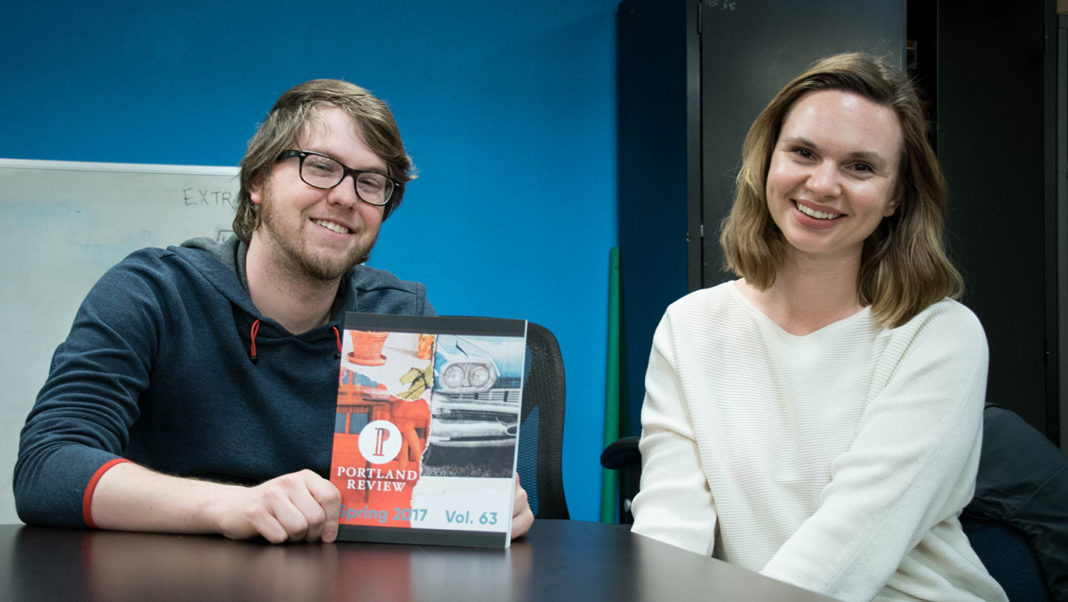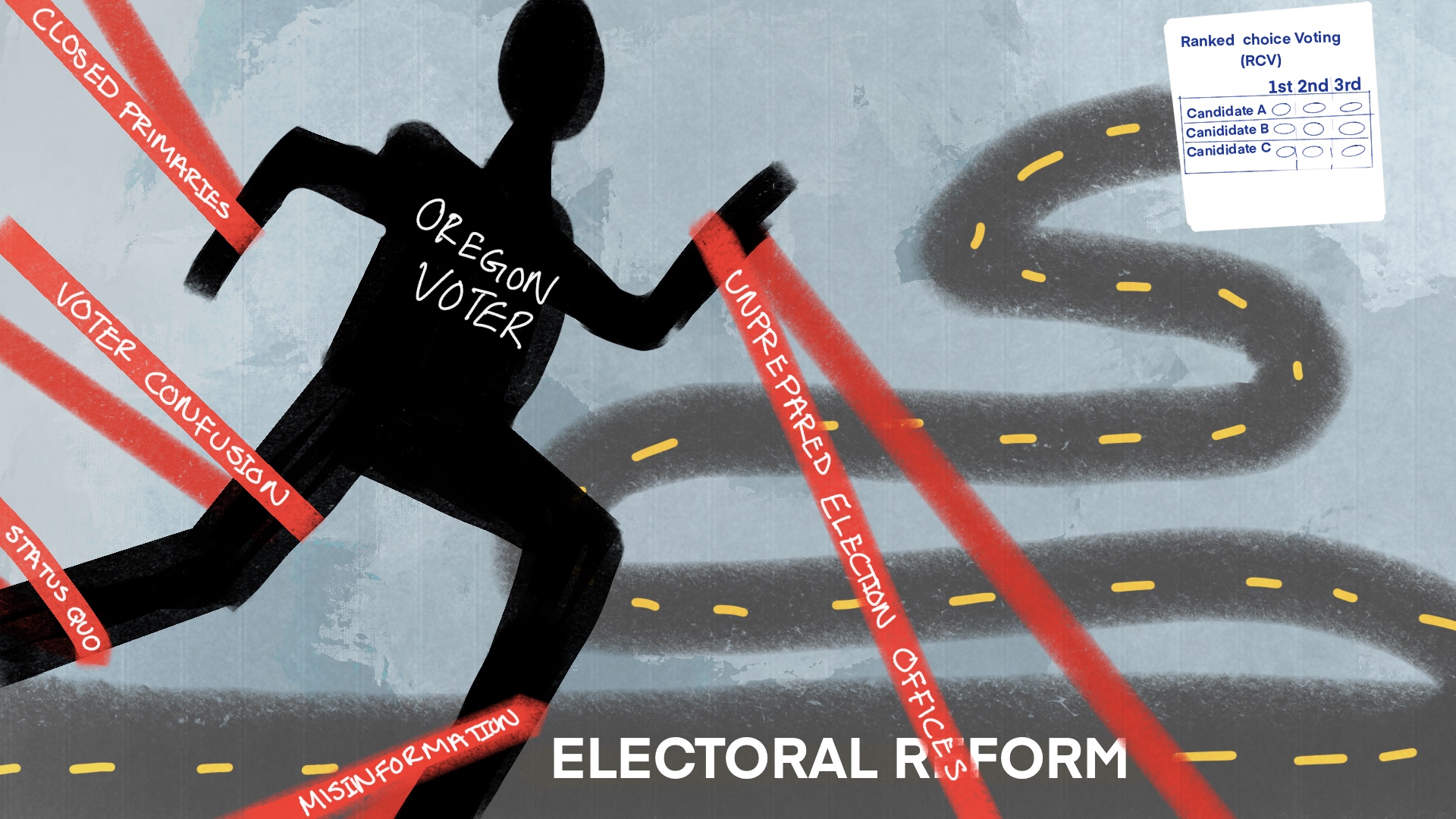“I wasn’t planning to write about Ursula,” said Portland State professor Tony Wolk. “You tend not to write about your good friends.”
Professor Wolk’s “The Word for World is Ursula” is an ode to his late and dear friend Ursula K. Le Guin, the beloved fantasy novelist whom he knew for half a century before her death on Jan. 22, 2018.
Wolk’s piece was published in Propeller, an online magazine run by fellow PSU English Senior Instructor Dan DeWeese. When DeWeese asked him if he would write about Le Guin for the magazine, Wolk said he’d think about it, but with inspiration from Harry Mathews’ book The Orchard: A Remembrance of Georges Perec, he was able to polish his own list of remembrances.
Wolk had already begun writing about Le Guin the day after he learned of her passing. “I just sat down. I journal a lot on my computer, and I wanted to recapture everything I could remember,” he said.
“I remember meeting Ursula for the first time and her taking off her shoes for the sake of our hardwood floors, one shoe black, the other brown” – Wolk, Propeller Magazine.
Wolk was first introduced to Le Guin’s writing by a student who mentioned his history professor’s wife had written a science fiction novel. The story, Rocannon’s World, was part of a 35-cent Ace double, a book wherein one story finished halfway through and the second story could be found by flipping the book over.
When Le Guin’s groundbreaking gender-fluid Left Hand of Darkness came out in 1969, Wolk and his wife Lindy decided to invite her over for dinner. “And that’s when she came over with the multi-colored shoes,” said Wolk.
Wolk has been teaching at PSU since 1965 and co-taught classes with Le Guin and her husband Charles. In 1975, Wolk was directed to ask Le Guin to teach a science fiction class at PSU. She suggested they teach it together.
“The two of us ran off the stories in the basement of the Division of Continuing Education with a kind of grinding thing that makes multi-copies,” said Wolk. “Everyone wrote things and everyone read them and responded to them, including Ursula, and then I had to do the same thing. And that’s what set me on the road to being the writer I am. I probably made her writing worse with my bad jokes or something, but [her] influence on me was enormous because without her I wouldn’t have been writing.”
Wolk has now published four books: Abraham Lincoln: A Novel Life, Good Friday and Lincoln’s Daughter through PSU’s own Ooligan Press and The Parable of You through Propeller Books.
Throughout the rest of his teaching career, Wolk has always found a way to bring Le Guin’s writing—and sometimes the writer herself—into the classroom. He recalled pointing, on various occasions, out of classroom windows in the direction of Le Guin’s home on Thurman Street at the edge of Forest Park. “It was wonderful to say, ‘She lives over there, and she’s going to be coming to the class tomorrow.’”
“I remember Ursula phoning early one morning to tell me she dreamed I’d won the Pulitzer Prize. I guess what I’d won was the Ursula Prize,” –Wolk, Propeller Magazine.
In the middle of January, Wolk sent Le Guin an email quoting writer Jorge Luis Borges from Borges at 80: Conversations:
“…What can I do? I’m over 80. I am blind. I am very often lonely. What else can I do but go on dreaming, then writing…My fate is to think of all things, of all experiences, as having been given me for the purpose of making beauty out of them. I know that I have failed. I’ll keep on failing, but still that is the only justification of my life.”
Borges was referring to his experience as an aging writer staring death in the face. He would go on to live another six years. Le Guin wrote back to Wolk, telling him of her writing-in-progress:
“I have been letting a story lead me where it will. Very slowly. It is such a pleasure to follow, to find out where it’s going. Like walking beside our creek in the California hills. Of course the creeks there mostly stop running in the summer. But they’re there; if you dig into the sandy adobe it gets damper and damper. And now and then the water runs out in the open again for a little ways.”
She died at home in Portland a week later.
“I had no idea when I wrote the message that she would only be living one more week and would never be finishing that story,” said Wolk. “But you can tell from the way she wrote that little message that, ‘This is a writer.’ It was just beautifully written, what she had to say.”
Perhaps the story was never intended for an audience. “She told me a few days ago she felt a little guilty because she was just writing for her own pleasure now,” said Theo, Le Guin’s son, in an interview with The Guardian. For the pleasure of following, of digging, of letting the water run out in the open—if only for a little ways.
“It is good to have an end to journey toward,” Le Guin wrote in The Left Hand of Darkness, “but it is the journey that matters in the end.”






